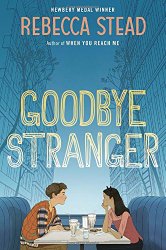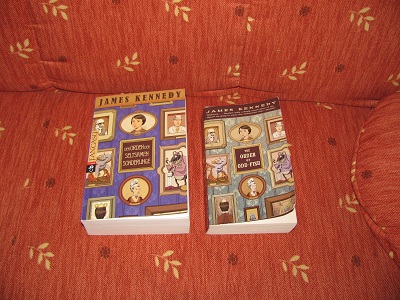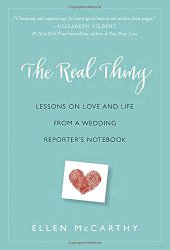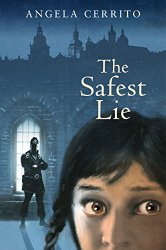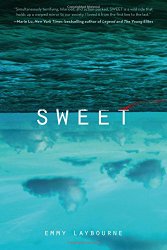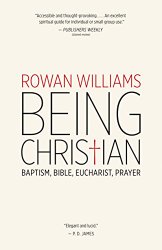Review of Goodbye Stranger, by Rebecca Stead
by Rebecca Stead
Random House Children’s Books, August 2015. 286 pages.
Starred Review
I got an Advance Reader Copy of this book at ALA Midwinter Meeting, and got it read on the flight to ALA Annual Conference.
I love Rebecca Stead’s books. Hers are about character — and always feature a character who feels like a normal kid — but with quirks.
Bridge Barsamian was in a terrible accident when she was 6 years old and almost died. As she left the hospital, a nurse told her, “You must have been put on this earth for a reason, little girl, to have survived.” She’s always wondered what that reason might be.
Now Bridge and her two best friends, Emily and Tabitha, are in seventh grade. And things are changing. Emily has suddenly grown curves and has become hugely popular. A boy is sending her pictures… and wants a response.
Bridge started wearing the cat ears in September, on the third Monday of seventh grade.
The cat ears were black, on a black headband. Not exactly the color of her hair, but close. Checking her reflection in the back of her cereal spoon, she thought they looked surprisingly natural.
And once she gets started wearing the cat ears, it’s hard to stop.
This book follows three different voices. One is Bridge, dealing with seventh grade, and how things are changing between her friends. Another is Sherm. He’s writing letters to his grandfather, who recently left their family. He doesn’t send them. Along the way, he writes about this girl who wears cat ears.
Another voice is someone using second person who has decided to take a mental health day on Valentine’s Day. She tries to keep her parents from worrying, but isn’t successful. But she still doesn’t go home. She’s thinking about all that led up to this day.
All the plot threads of the book lead up to Valentine’s Day. There’s no big reveal or plot twist. (There is a little reveal of who is skipping school.) But all the threads wind up, in a nice satisfying story. You can’t help but like these kids, living their lives and figuring out why they were put on this earth — in lovely, quiet, quirky ways.
This is very much a novel about friendship — and friends who let their friends down. But don’t we all let our friends down, in some way or other? This book is about the hard decision of when to give our friends another chance.
rebeccasteadbooks.com
randomhousekids.com
Find this review on Sonderbooks at: www.sonderbooks.com/Childrens_Fiction/goodbye_stranger.html
Disclosure: I am an Amazon Affiliate, and will earn a small percentage if you order a book on Amazon after clicking through from my site.
Source: This review is based on an Advance Reader Copy I got at ALA Midwinter Meeting.
Disclaimer: I am a professional librarian, but I maintain my website and blogs on my own time. The views expressed are solely my own, and in no way represent the official views of my employer or of any committee or group of which I am part.
What did you think of this book?
